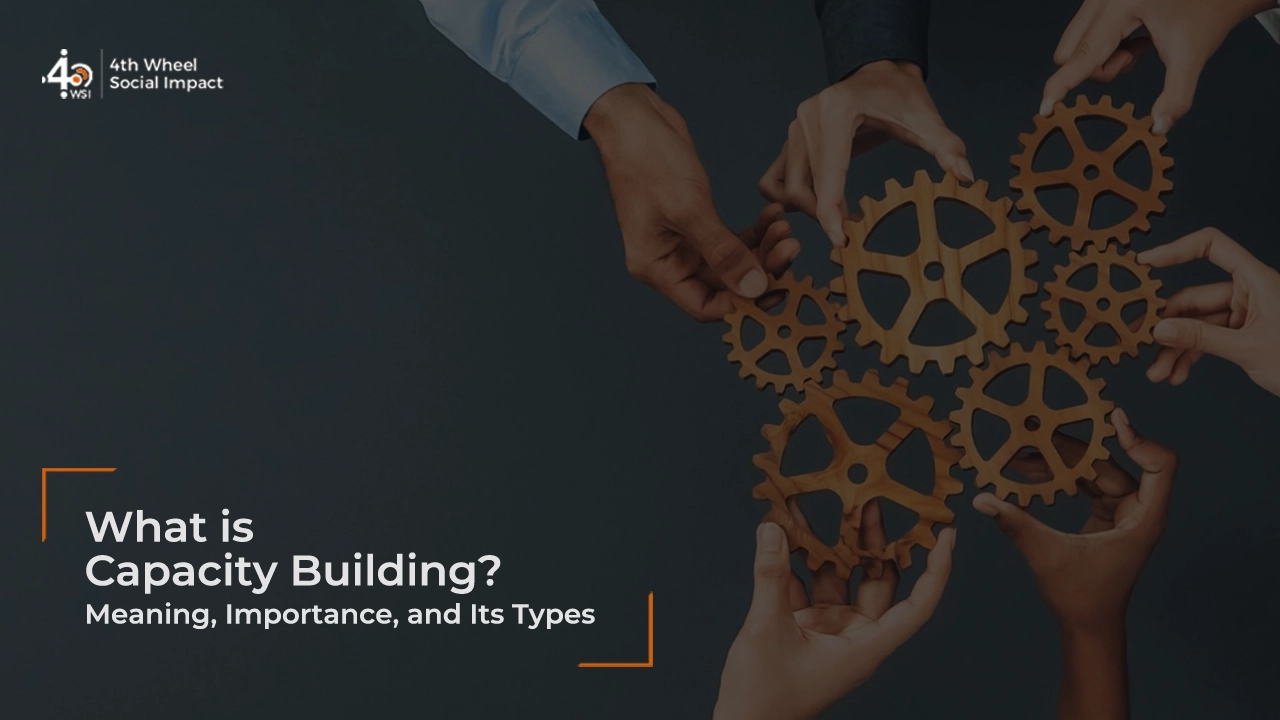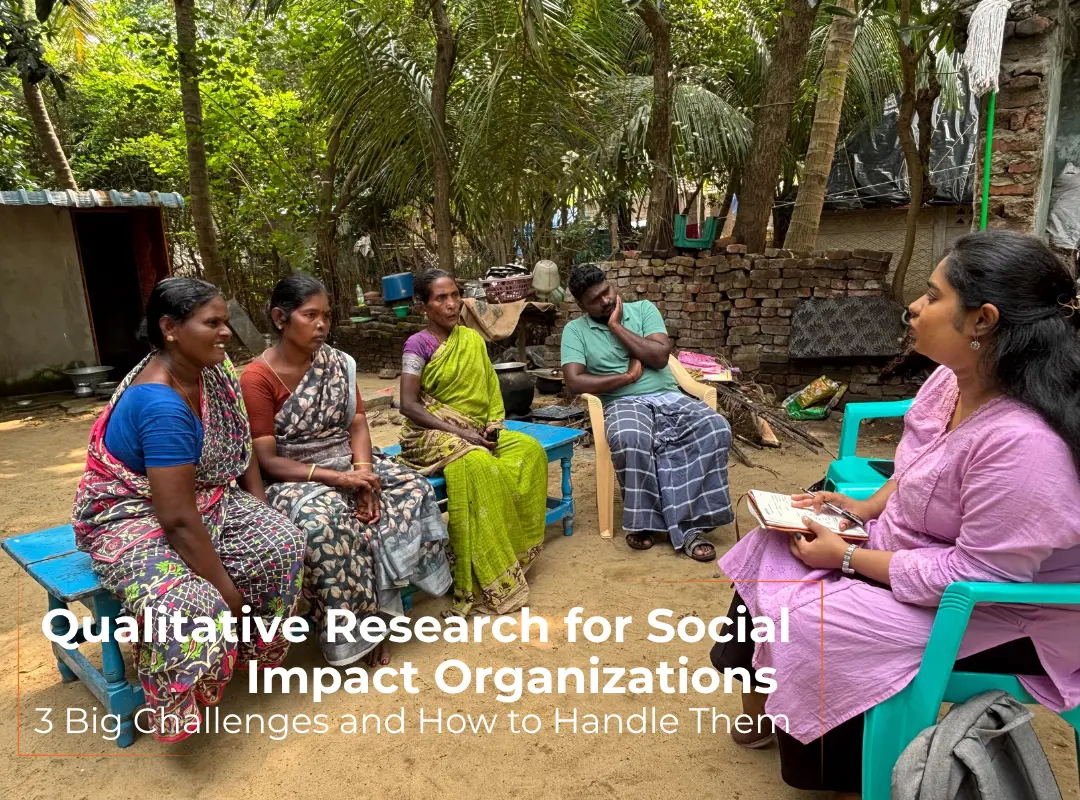Organizations grow stronger when they invest in skills, systems, and structures that last. This is the core of capacity building. It is a long-term process that improves how individuals and institutions perform, adapt, and deliver results. Done well, it creates a deeper impact and greater accountability in every project.
At 4th Wheel, we work as trusted capacity building consultants for nonprofits, corporates, and development programs. Our role is to design and deliver capacity-building programs that strengthen people and systems in a sustainable way. With a mix of research, training, and contextual solutions, we help organisations unlock their full potential.
Meaning of Capacity Building
So, what is capacity building? At its simplest, it means developing the knowledge, skills, resources, and systems that people and organizations need to perform better. This capacity building definition covers both individuals and institutions.
To define capacity building in practice, it is the process of strengthening abilities so that a person, team, or system can achieve goals more effectively. The meaning of capacity building goes beyond one-time training. It is about creating stronger foundations that last and can adapt to change.
In development projects, capacity building training is often used to equip staff, partners, and communities with practical skills. However, it also includes designing stronger processes, better governance, and smarter use of resources.
Read Next: Capacity Building and Peer Learning for Strengthened Social Service Delivery

Why is Capacity Building Important?
Strong programs and organizations depend on capable people and systems. Capacity building confirms that both are developed with purpose and clarity. It improves effectiveness, strengthens accountability, and helps teams adapt in changing conditions. The results are lasting organizational and social impact and stronger trust among stakeholders.
1. Builds Stronger Organizations
The importance of capacity building in an organisation lies in its ability to strengthen internal structures. Clear governance, transparent processes, and skilled staff together create an environment where projects can scale and thrive. This not only improves day-to-day operations but also builds resilience against risks and external pressures.
2. Improves Accountability
Capacity building programs emphasize clear roles, data-driven decisions, and strong reporting systems. This leads to accountability at every level, from leadership to field staff. Donors and stakeholders gain greater confidence when they see transparent operations. Communities also feel more trust toward organizations that show responsible and ethical practices in their work.
3. Supports Long-Term Sustainability
Short-term wins rarely translate into lasting change. The benefits of capacity building extend to sustainability by building foundations that endure beyond one project cycle. Teams trained through capacity building training continue applying their knowledge in future projects. Systems established during the implementation and M&E processes also stay in place and reduce dependency on external help.
4. Encourages Adaptability
Challenges change over time, and organizations must respond quickly. Capacity-building steps prepare leaders and teams to adapt without losing focus. This adaptability comes from developing not only skills but also flexible structures and processes. In a shifting environment, such readiness makes organizations more capable of delivering consistent outcomes with confidence.
5. Strengthens Community Impact
The real importance of capacity building shows up in the impact on communities. Skilled teams design and run programs that address real needs. Strong organizations deliver projects that reach more people and create deeper value. As a result, both individuals and communities benefit from long-term improvements in education, health, livelihoods, and governance.
What are the Different Types of Capacity Building?
Depending on the requirements of individuals and organizations, capacity building can take many forms. Each type focuses on strengthening a specific area, but together they create a complete system for growth and impact.
1. Individual Capacity Building
This type focuses on building the skills, knowledge, and confidence of individuals. Through capacity building training, people gain tools that improve their personal performance and leadership abilities. It is commonly applied to staff, volunteers, and community members who play active roles in programs. Strong individuals become the foundation of strong institutions.
2. Institutional Capacity Building
Institutions need structures that support clear governance, transparent decision-making, and efficient processes. Institutional capacity building creates these systems through better management practices, strong financial controls, and policy development. By strengthening the backbone of organizations, it makes sure that programs are executed effectively and resources are used responsibly across projects.
3. Community Capacity Building
Communities play an essential role in development programs. Community capacity building strengthens local leadership, encourages participation, and supports collective problem-solving. When communities understand their own strengths and needs, they can design solutions that work in their context. This form builds self-reliance and reduces dependency on outside organizations.
Read Next: Understanding Community Based Research
4. Organizational Capacity Building
Organizations grow stronger when they can manage projects, staff, and partnerships effectively. Organizational capacity building addresses areas like leadership development, fundraising, stakeholder engagement, and program design. It focuses on improving overall performance so that organizations can expand their reach, deliver better results, and create meaningful social impact.
Interesting reads: How to Measure Social Impact: A Step-by-Step Guide

Objectives of Capacity Building
The main aim of capacity building programs is to strengthen people and systems for long-term growth. These objectives guide organizations as they design and invest in training and structural improvements.
- Build Skills: Develop technical, managerial, and leadership skills for sustained performance
- Improve Systems: Strengthen governance, processes, and structures within organizations
- Encourage Participation: Promote stakeholder engagement and collaboration at every level
- Boost Sustainability: Create foundations that continue beyond single projects or funding cycles
- Drive Accountability: Support transparency, ethical practices, and strong reporting systems
Best Capacity Building Activities
Capacity building activities put theory into practice. These activities combine training, knowledge sharing, and practical tools to strengthen individuals, organizations, and communities. When designed well, they make learning interactive and create lasting improvements in performance.
1. Training and Workshops
Training and capacity building workshops provide hands-on learning in specific areas such as leadership, project management, or technical skills. These sessions are tailored to the needs of participants and encourage interactive learning. Regular practice and feedback makes sure that new knowledge is applied effectively in real-world scenarios.
2. Mentorship and Coaching
Mentorship is a powerful capacity development activity where experienced professionals guide individuals or teams. Through one-on-one sessions, mentors provide feedback, share insights, and support personal growth. Coaching helps build confidence, refine leadership skills, and improve decision-making. These approaches complement formal training by providing practical, ongoing support.
3. Peer Learning Networks
Peer learning builds communities of practice where individuals and organizations share experiences and knowledge. These networks are highly effective capacity building activities because they connect people facing similar challenges. By exchanging ideas and strategies, participants learn faster, avoid repeated mistakes, and strengthen collective skills.
4. Knowledge Management Systems
Knowledge management involves creating systems that capture and share information within organizations. This capacity building activity includes databases, resource libraries, and digital tools. Strong systems make it easier for staff to access data, learn from past projects, and make informed decisions. This reduces duplication and supports organizational efficiency.
5. Technical Assistance
Many organizations turn to experts for specialized capacity building programs. Technical assistance provides guidance in areas such as monitoring and evaluation, financial planning, impact evaluation, or data analysis. Consultants like 4th Wheel help organizations design tailored solutions that meet their unique challenges. This delivers practical improvements in both systems and skills.

Examples of Capacity Building Initiatives
Examples make the meaning of capacity building clearer. Across sectors, these initiatives show how structured programs and activities can strengthen skills, systems, and communities.
1. Training for Local Leaders
In rural development projects, capacity building training often targets community leaders. These leaders receive guidance in governance, conflict resolution, and financial planning. As a result, they can manage resources better, lead collective actions, and represent community interests in larger development discussions.
2. Institutional Strengthening in NGOs
Many NGOs run capacity building programs focused on financial management, human resources, and compliance. These initiatives ensure organizations meet donor expectations and follow strong accountability practices. Over time, NGOs become more resilient and capable of scaling their work to reach larger populations with confidence.
3. Public Health Workforce Development
Health programs invest in building capacity training for doctors, nurses, and support staff. Training covers medical knowledge, patient care, and data reporting systems. These efforts improve the quality of health services, reduce errors, and help health institutions deliver better outcomes in both urban and rural communities.
Read Next: How Data Analytics Tools Improve Rural Health Care
4. Educational Capacity Development
Schools and education-focused nonprofits rely on training and capacity building to equip teachers with modern skills. Programs include workshops, digital learning tools, and peer mentoring. Stronger teachers improve learning outcomes for students and create sustainable models that benefit entire education systems.
5. Corporate CSR Programs in Skill Development
Corporates often invest in capacity development services as part of CSR strategies. One strong example is the HDFC Bank’s Focused Development Project (FDP) in Uttarakhand and Odisha. This project combined skill training, counseling, placement support, and follow-up support with capacity development at its core.
By including training needs assessment, batch formation, internal and external evaluations, and SROI analysis, the initiative helped young people move into sustainable careers. This kind of structured support shows how capacity building programs can unlock real socio-economic value.
Conclusion
So we circle back to the same question: what is capacity building? More than a series of decisions, it is the backbone of stronger organizations and lasting social impact. By developing skills, improving systems, and empowering communities, it creates results that sustain far beyond a single project or funding cycle.
The advantages of capacity building are clear. It builds accountability, strengthens governance, and makes institutions resilient to change. The types of capacity building, from individual to institutional, cover every level of growth, while structured capacity building activities see to it that knowledge turns into action.
For organizations looking to scale impact with confidence, working with experienced capacity-building consultants is the smartest step forward. At 4th Wheel, we design capacity-building programs that are practical, data-backed, and tailored to context. With our expertise in various capacity development services, we help partners achieve sustainable results and long-term value for the communities they serve.
Ready to strengthen your organization?
Get in touch with 4th Wheel today and start building capacity that lasts.




